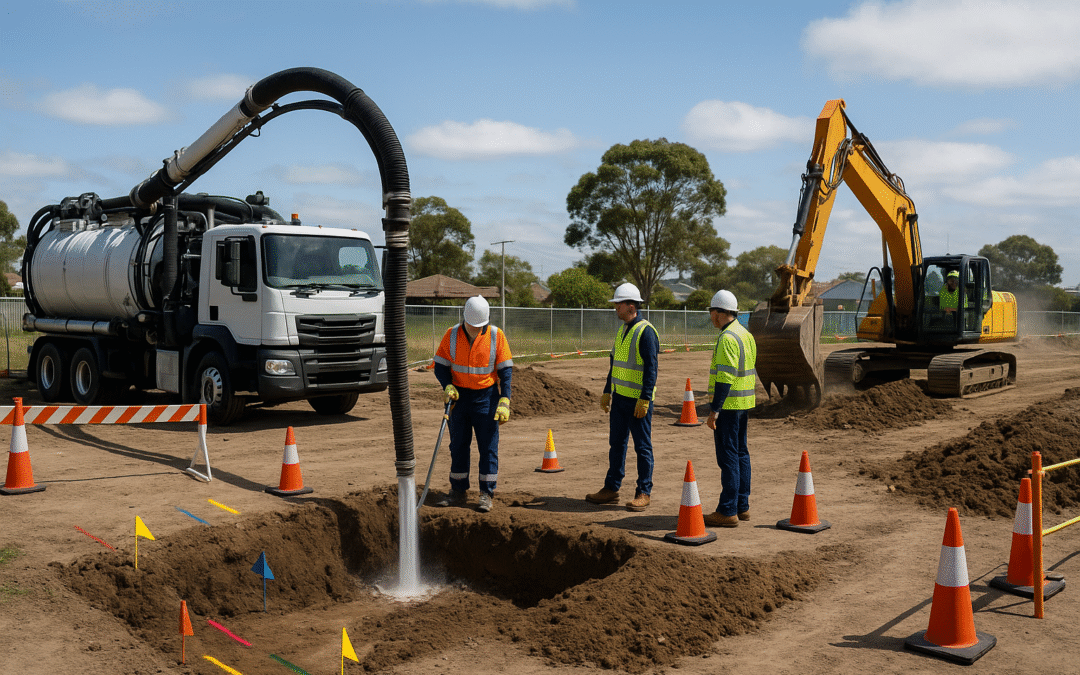Excavation is one of the processes crucial in most construction and utility projects. From line trenching of pipelines, electrical conduits or gardening, an appropriate excavation technique will save time, cost less and avoid avoidable damage.
Contractors and project managers today have to decide between conventional excavation and hydro excavation. Knowing the contrasts between the two methods may enable you to make a choice.
Get to Know About Traditional Excavation
In traditional excavation, backhoes, excavators, and bulldozers are used in order to cut soil and rock. For decades, it has been the standard method and is commonly employed to do mega-projects. This is an effective means of carrying huge loads of materials within a very limited duration of time, especially in the remote open territories.
Further, there is a high chance of affecting the surrounding environment due to its interference, which forces soil to be displaced and eventually eroded.
What is hydro excavation?
Hydro excavation is a newer technique that involves pressurised water that will disturb soil with a vacuum system to get the debris out. It is an accurate method of digging that causes minimal access to underground utilities. Hydro excavation can also be called soft digging, as it minimises the risk of inadvertent damage in line with standard procedures.
This technique can be applied especially within urban places, sensitive environments or near critical facilities.
Factors to Consider When Choosing an Excavation Method
Choosing an appropriate excavation technique is a matter of several issues. Here’s what to consider:
Site Conditions
The health of your site is a significant factor. Hydro excavation tends to be safer where the ground conduits are dense, where the space is too narrow or on structures that are weak. Conventional excavation could be ideal when there are no underground utilities to be of much concern and the space covers a wide area.
Project Size and Scope
The conventional excavation is cost-efficient and fast in large-scale work like the construction of foundations or open spaces. Smaller projects that are not so big, like potholing one or fixing a utility, are activities that are suited to hydro excavation.
Safety Considerations
One of the central issues should be safety. Hydro excavation greatly eliminates the chances of striking gas lines, water pipes or electrical cables. When your construction is underground, you can select hydro excavation in case there are unknown utilities in the process.
Environmental Impact
Hydro excavation is also less upsetting to the environment. It minimises soil displacement and soil erosion as well as the destruction of vegetation around. Conventional excavation might be more disruptive and might need more restoration of the site.
Project Timeline
Choices may be determined by time. Large and open excavations may be quicker in traditional excavation. But hydro excavation occasionally saves time on work, where accuracy can reduce expenses if utility damage and rework occur.
How to Choose Hydro Excavation Contractors?
The process of choosing the right contractor is just as crucial as the choice of the excavation method. Here are some tips to choose hydro excavation contractors effectively:
Experience and Expertise
Find contractors who have experience dealing with hydro excavation projects in relation to yours. The established contractors are well conversant with the intricacies of the soils, utility mapping and site conditions.
Equipment Quality
Hydro excavation machines entail special machinery such as water systems and vacuum trucks. Make sure that the contractor operates renewed and well-appointed equipment.
Safety Record
Examine the safety history of the prospective contractors. A good safety record is a sign that the contractor takes great care in their excavation and protects the safety of workers and underground utilities.
References and Reviews
Request a reference or read other reviews by former customers. The contractors will be reliable and have a track record of good projects and satisfied clients.
Compliance and Insurance
Check the compliance of the contractor with the local regulations and possession of required insurance. This saves you against possible proposed liabilities in the event of a setback or damage to the buildings.
Cost Transparency
Request accurate quotes and get pricing elaborated. Qualified contractors do not quote prices with an unknown extra, and you are able to plan your budget in accordance.
Final Thoughts
Selecting between hydro excavation and conventional excavation is dependent on your project criteria, site factors, budget and safety necessities. Hydro excavation is the most favoured approach to accurate, safe and environmentally safe excavations, in particular in utility-sensitive areas. The conventional excavation is effective on bigger and less sensitive projects.
VWD Group provides professional hydro excavation and traditional excavation to businesses and homeowners with a reliable excavation package that fits your project. You require accurate hydro excavation or effective conventional digging; our crew promises good workmanship, safety, and prompt performance. Contact the VWD group today to talk about your project and the smooth excavation process.

